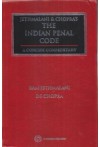- Author(s): Ram Jethmalani, DS Chopra
- Edition: 1 Ed 2017
- ISBN 13 9788193319659
- Approx. Pages 1170 + Contents
- Format Paperback
- Delivery Time Normally 7-9 working days
- Shipping Charge Extra (see Shopping Cart)
.........................................................................................................................
Description
The history of the Indian Penal Code prevailing in British India commences with the year 1833, the year followed the Reform Bill, a period which was full of law reform in general and Criminal Law in particular. Indirectly, the Indian Penal Code owed its origin to Bentham the most well-known jurist of the day on the subject of law reform. James Mill the favourite disciple of Bentham had written the history of British India under the influence of Bentham's ideas. The Code reflects the thinking of these two jurists. In 1933, Lord macaulay moved in the House of Commons to codify the whole Criminal Law in India and bring about uniformity. Lord macaulay while speaking on the Bill in the British Parliament said; "I believe that no country ever stood so much in need of a Code as India, and I also believe that there never was a country in which the want might be so easily supplied, Our principle is simply this — uniformity when you can have it; diversity when you must have it; but in all cases certainty." Lord macaulay also told the House of Commons that Mohmmedans were governed by the Koran and in the Bombay Presidency Hindus were governed by the institutes of Manu. Pandits and Kajis were consulted on point of law and in certain respects the decisions of the courts were arbitrary. Thus the year 1833 was a landmark in the history of codification in India. The Charter Act of 1833 introduced a single legislature for the whole of British India. The legislature was empowered to legislate for Hindus and Mohammedans alike as also for Presidency towns and Moffusil areas. Under the Charter Act, 1833 the Governor General of India was empowered to legislate for the whole of India. A commission was appointed under the chairmanship of Lord macaulay with Mr. Millet and Sir John M'Leod as other two members. During 1834-38 the Preface commission drafted what afterwards came to be known as the Indian Penal Code. From 1838 to 1860 the draft code remained in the form of a mere draft. After elaborate revision by the Legislative Council under the supervision of late Sir Barnes Peacock the Bill became the Indian Penal Code, Act XLV of 1860. There have been seventy five amendments since 1860 to the Indian Penal Code most of which being of not much consequence.
.........................................................................................................................
Contents
THE INDIAN PENAL CODE
CHAPTER I INTRODUCTION
CHAPTER II GENERAL EXPLANATIONS
CHAPTER III OF PUNISHMENTS
CHAPTER IV GENERAL EXCEPTIONS
CHAPTER V OF ABETMENT
CHAPTER VA CRIMINAL CONSPIRACY
CHAPTER VI OF OFFENCES AGAINST THE STATE
CHAPTER VII OF OFFENCES RELATING TO THE ARMY, NAVY AND AIR FORCE
CHAPTER VIII OF OFFENCES AGAINST THE PUBLIC TRANQUILLITY
CHAPTER IX OF OFFENCES BY OR RELATING TO PUBLIC SERVANTS
CHAPTER IXA OF OFFENCES RELATING TO ELECTIONS
CHAPTER X OF CONTEMPTS OF THE LAWFUL AUTHORITY OF PUBLIC SERVANTS
CHAPTER XI OF FALSE EVIDENCE AND OFFENCES AGAINST PUBLIC JUSTICE
CHAPTER XII OF OFFENCES RELATING TO COIN AND GOVERNMENT STAMPS
CHAPTER XIII OF OFFENCES RELATING TO WEIGHTS AND MEASURES
CHAPTER XIV OF OFFENCES AFFECTING THE PUBLIC HEALTH, SAFETY,
CONVENIENCE, DECENCY AND MORALS
CHAPTER XV OF OFFENCES RELATING TO RELIGION .
CHAPTER XVI OF OFFENCES AFFECTING THE HUMAN BODY
CHAPTER XVII OF OFFENCES AGAINST PROPERTY
CHAPTER XVIII OF OFFENCES RELATING TO DOCUMENTS AND TO PROPERTY MARKS
CHAPTER XIX OF THE CRIMINAL BREACH OF CONTRACTS OF SERVICE
CHAPTER XX OF OFFENCES RELATING TO MARRIAGE
CHAPTER XXA OF CRUELTY BY HUSBAND OR RELATIVES OF HUSBAND
CHAPTER XXI OF DEFAMATION
CHAPTER XXII OF CRIMINAL INTIMIDATION, INSULT AND ANNOYANCE
CHAPTER XXIII OF ATTEMPTS TO COMMIT OFFENCES
APPENDICES
.........................................................................................................................
Author Details
Ram Jethmalani, LL.M. Senior Advocate, Supreme Court of India Former Union Minister for Law and Justice Co-author of: Code of Criminal Procedure (2 Vols.); Indian Penal Code (2 Vols.); Law of Evidence (Concise Ed.); Parliamentary Privileges Law and Practice, Media Laws (2 Vols.)
AND
Prof. D.S. Chopra, B.SC., LL.M., Advocate Co-author of: Code of Criminal Procedure (2 Vols.); Indian Penal Code (2 Vols.); Media Law (2 Vols.); Parliamentary Privileges (Law and Practice);Law of Evidence (Concise Ed.); Cases and Materials on Evidence Law (2nd Edn.); Interpretation of Statutes; Company Law Piercing the Corporate Veil;
Author : Cases and Materials on Contract and Specific Relief (2nd Edn.); Law Relating to Government Servants; Payment of Bonus Act, 1965 (4th Ed.); Payment of Wages Act, 1936 (4th Ed.); Factories Act, 1948 (4th Ed.); Minimum Wages Act (3rd Ed.); Law Relating to Provident Funds, 2nd Ed.; Payment of Gratuity Act, 3rd Ed.; Sale of Goods, Partnership & Negotiable Instrument.
.........................................................................................................................

